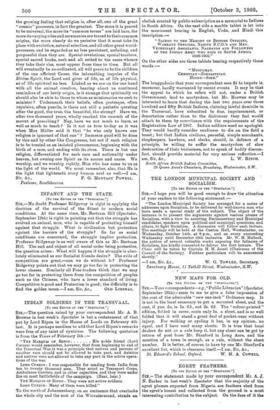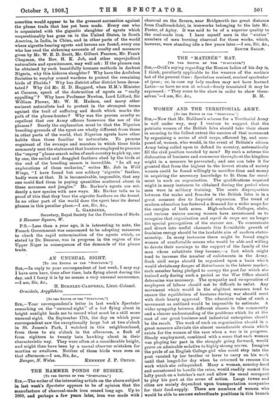EGRET FEATHERS.
[To TEE EDITOR Or THE ," SPECTATOR:'] SIR,—.Tbe statement made by your correspondent Mr. A. J.
N. Barker in last week's Spectator that the majority of the egret plumes exported from- Nigeria are feathers shed from the:egret's breast and collected from the grouncUis a. most interesting contribution to the subject. On-the face of it the assertion would-appear to be the grossest accusation against the plume trade that has yet been made. Every one who is acquainted with the gigantic slaughter of egrets which unquestionably has gone on in the United States, in South America, in India, in China, and in other parts of the world where aigrette-bearing egrets and herons are found, every one who has read the sickening accounts of cruelty and massacre given by Mr. W. E. D. Scott, Mr. Gilbert Pearson, Mr. Frank Chapman, the Rev. H. K. Job, and other unprejudiced naturalists and eyewitnesses, may well ask : If the plumes can be obtained by such beautifully humane methods in darkest Nigeria, why this hideous slaughter ? Why have the Audubon Societies to employ armed wardens to protect the remaining birds of Florida? Why has district after district been devas- tated P Why did Mr. H. D. Haggard, when H.M.'s Minister at Caracas, speak of the destruction of egrets as " really appalling" ? Why have Professor Newton, Lord Lilford, Sir William Flower, Mr. W. H. Hudson, and many other eminent naturalists had to protest in the strongest terms against the trail of suffering and death which marks the path of the plume-hunter? Why was the proven cruelty so repellent that our Army officers foreswore the use of the plumes P Surely the explanation must be that the Nigerian breeding-grounds of the egret are wholly different from those in other parts of the world, that Nigerian egrets have other habits than those familiar to naturalists. To persons cognisant of the swamps and marshes in which these birds commonly nest the statement that hunters employed to procure the "osprey" plume search miles of such country to pick up, one by one, the soiled and draggled feathers shed by the birds at the end of the breeding season is incredible. "In all my explorations of these rookeries," writes Mr. Job in Wild Wings, "I have found but one solitary ' aigrette' feather, badly worn at that. It is inconceivable, impossible, that any one could find them in paying quantities scattered about in these morasses and jungles." Mr. Barker's egrets are evi- dently a new species with new ways. Mr. Barker tells us in proof of this that they bear the aigrette feathers on the breast. In no other part of the world does the egret bear its dorsal plumes in this peculiar place.—I am, Sir, &c., L. GARDINER,
Secretary, Royal Society for the Protection of Birds. 3 Hanover Square, W.
P.S.—Less than a year ago, it is interesting to note, the French Government was announced to be adopting measures to check the rapid extermination of the egrets which, as stated by Dr. Decorse, was in progress in the region of the Upper Niger in consequence of the demands of the plume trade.

























































 Previous page
Previous page